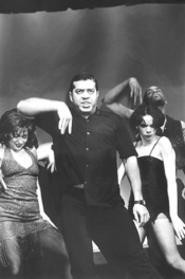Their last, best hope for a chance to shine was a Big Apple boss named Brad Lohrenz. Although Lohrenz was their man, reaching him involved charming the pants off several layers of secretaries, assistants, and assistants to assistants. So they did what any plucky Midwesterners would do: They bugged the heck out of his people. Eventually, Lohrenz's phone had no choice but to ring.
In a single day, Lohrenz, the head of amateur leasing musicals for Samuel French publishers, took about 20 desperate calls from downtrodden suburban dramaturges who'd suddenly found themselves without a show or a place to perform it.
"They were in a bit of a pickle," he says. "We felt sorry for them. I made a couple of phone calls."
The leotarded locals should have been busily rehearsing Chicago: The Musical for Cuyahoga Community College's Western Campus Theatre. The auditions alone had attracted about 200 people in varying degrees of Bob Fosse undress. "I believe it was the most amazing callback anywhere in the city," declares choreographer Gustavo Urdaneta, a gregarious, gesturing man who's not prone to understatement.
But what's showbiz without a hard-luck story? No sooner had the show been cast than a confounded Urdaneta had to phone the "most talented 25 people in town" and tell them it was off. Tri-C West had dumped the production without warning.
"After we had gone through the whole process, the dean of the college decided that she didn't want to do it," fumes Urdaneta. "It's like 'Here's a lollipop, you cannot have it.' I had already choreographed two numbers for the show. The two most intrinsic numbers."
The cast was mystified. Why would the college cancel an exclusive production of a smash Broadway musical? Landing the rights in the first place had seemed like dumb luck, but not as dumb as canning the whole thing. Tri-C West's Carol Franklin, dean of liberal arts, says adding the show to their regular season schedule had been an exercise in wishful thinking. When the planets unexpectedly aligned, the theater department couldn't drum up $18,000 to stage it.
An environmental engineer turned choreographer who's usually a ball of raw energy, Urdaneta was depressed by the news. Then he became undepressed (he moves fast). "I made about 24 calls in an hour. I called my wife at work: 'What do I do?' 'Do what you always do. Think on your feet.'"
That he could manage. A Fulbright scholar who immigrated to the United States from Venezuela, Urdaneta, 33, leaps headlong into everything. In college, besides being the only dancing engineer on campus, he joined the school paper, the Black Student Union, and an all-white fraternity. "I came from abroad. All of this was new, so why not explore it all?"
His SOS to theater friends was intercepted by Christine Hnat, executive director of the tiny Paul W. Cassidy Theater in Parma Heights, which is about a third the size of the Tri-C theater. "He sounded very distraught," Hnat recalls. She got on the horn with the mayor of Parma Heights, who got on the horn with council, who fronted money for the itinerant troupe to stage a scaled-down production at Cassidy.
It was perfect timing. Over the years, the Cassidy (formerly called the Greenbriar) had dependably cranked out "commercial clean" productions of bluehair standards like Oklahoma! and The Sound of Music. But when Hnat took over in 2000, she hired Urdaneta to choreograph Pippin and run their good name through the mud.
"I did it all blown out -- leather, rubber, vinyl," reminisces Urdaneta. "The roughest word you heard was 'fornication,' but it was verrrry sexual. Chris really opened the door for us. Years ago, when I did A Chorus Line there, I couldn't even say 'tits and ass.'"
Hoping to salvage the coveted rights to Chicago, Hnat called Lohrenz, who was doubtful. The New York producers of the Tony Award-winning revival had just invested millions in a touring production that was destined for far grander houses than the Parma Heights Players.
So Hnat tried the wounded-puppy tack. "I told him what a great cast it was, and now they're homeless. Somehow, we touched a chord." Lohrenz quietly rushed their plea through, and the producers personally cleared the way for nine performances in May.
Lohrenz downplays his intervention. But that's OK. The bubbly yet analytical Urdaneta is happy to pick up the slack. By day, the father of two is a geometry teacher at Brush High School. ("I always wanted to teach. I'm good at that.") By evening, he's absorbed in high kicks and cleavage: "The dancers are dressed very sexual for this show. Lingerie, body stockings. People had to have no inhibitions about this. If I'm talking too fast, stop me. I'm getting excited about this."
While the actors are trickling in for rehearsal, Urdaneta is already working up a sweat in the theater lobby. Dressed in his after-work dad ensemble of denim shorts, tucked-in white T-shirt, and baseball cap (he'll change into dance clothes later), he's coaching female lead Trinidad Rosado. While alternately shimmying, flinging himself over a wooden chair, and spinning his index finger with Charleston flair, he shouts directions in English and Spanish.
"Huh huh huh huh," he chants, thrusting his brawny hips. "Ba dap dap ba duh." Seeing such a squarely built man move so agilely is slightly disconcerting. The whole scene seems stolen from a light romantic comedy where the macho hunk with the five o' clock shadow gets in touch with his female side for cheap laughs.
"Jesus Christ, this is like Jane Fonda on crack," huffs Rosado.
Though the space is scaled down for Chicago, Urdaneta's spirit isn't. "Two hundred people is a nice-sized house," he says diplomatically. "It's not 600. But we can make it intimate. We can make it really cabaret, really in-your-face and poignant."
The Broadway set is minimalist anyway, done up in solid black. "Dancers love black! It's a dance color," enthuses Urdaneta.
"For all this to happen, it's big for everybody. Last night in three hours, I choreographed three numbers. Thank God I was an engineer, and I knew something about flow charts. I knew something about manipulation of hours. Now I'm using that to move people around all the time." Add rubber and vinyl, and it's time for higher math.














